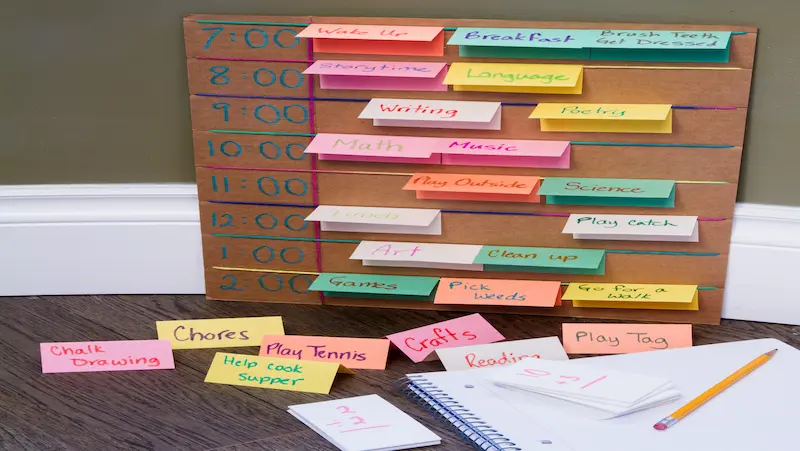In the ever-evolving landscape of education, where the traditional classroom has expanded its boundaries to embrace the concept of home as a center of learning, the role of time management has taken center stage. As parents and educators venture into the realm of homeschooling, they embark on an odyssey that demands not only a mastery of subject matter but also a deft navigation of time.
Welcome to a comprehensive exploration of “Homeschooling Time Management,” where we will unravel the intricacies of optimizing schedules, orchestrating learning activities, and fostering a balanced educational journey that transcends the boundaries of traditional schooling. In this article, we’ll navigate the intricate world of homeschooling time management, offering insights, strategies, and tools to ensure a successful and balanced educational journey for both parents and students.
Table of contents
- Introduction to Homeschooling
- Understanding Time Management in Homeschooling
- Assessing Your Homeschooling Needs and Goals
- Creating a Homeschooling Schedule
- Time Management Tools and Techniques
- Time Management for Special Needs Homeschooling
- The Role of Parents and Teachers in Homeschooling Time Management
- Conclusion
- Frequently Asked Questions (FAQs)
Introduction to Homeschooling

The Rise of Homeschooling
The rise of homeschooling refers to the increasing trend of parents choosing to educate their children at home rather than sending them to traditional public or private schools. This phenomenon has gained momentum over the past few decades for various reasons, and its popularity has been influenced by social, technological, and educational factors. Here are some key factors contributing to the rise of homeschooling:
1. Customized Education: Homeschooling allows parents to tailor the curriculum to their child’s individual needs, learning styles, and interests. This personalized approach can lead to better academic outcomes and a deeper understanding of subjects.
2. Flexibility: Homeschooling offers greater flexibility in terms of scheduling. Families can choose their own academic calendar, vacations, and daily routines, enabling a more relaxed and adaptable learning environment.
3. Challenging Traditional Education: Some parents feel that traditional schooling may not adequately meet their children’s academic or emotional needs. Homeschooling provides an alternative where parents can address these concerns directly.
Understanding Time Management in Homeschooling
Defining Time Management in the Homeschool Environment
Time management in the homeschool environment refers to the effective and organized allocation of time to various activities and tasks involved in educating children at home. It involves planning, prioritization, and scheduling to ensure that both academic and non-academic activities are appropriately balanced, leading to a productive and enriching homeschool experience. Mastering time management in homeschooling for children is an essential skill that cultivates discipline and maximizes learning. By establishing structured routines, setting clear goals, and teaching the value of efficient scheduling, parents can empower their children to take ownership of their education while also allowing for a healthy balance between academic pursuits and personal growth.
Here are the key aspects of time management in the homeschool setting:
1. Curriculum Planning and Scheduling: Homeschooling involves developing a comprehensive curriculum, planning lessons, assignments, and projects, and maintaining a clear schedule to ensure consistent learning and progression.
2. Setting Goals and Objectives: Defining clear educational goals for each child is crucial. These goals can be short-term (daily or weekly objectives) or long-term (yearly academic goals). Setting specific, measurable, achievable, relevant, and time-bound (SMART) goals helps in tracking progress effectively.
3. Time Blocking: Dividing the day into blocks of time dedicated to specific subjects or activities can help maintain focus and prevent multitasking. For example, designating mornings for core subjects like math and language arts, and afternoons for creative projects and extracurricular activities.
4. Flexibility and Adaptability: While having a structured schedule is important, flexibility is equally vital in the homeschool environment. Being open to adjustments based on the child’s pace of learning, interests, and unexpected events ensures a more adaptable and stress-free experience.
5. Prioritization: Not all activities carry equal weight in homeschooling. Prioritize subjects and tasks based on their importance and the child’s needs. This prevents burnout and ensures that essential learning objectives are met.
Assessing Your Homeschooling Needs and Goals

Assessing your homeschooling needs and goals is a crucial step to ensure a successful and fulfilling educational experience for your child. Here are some steps to help you effectively assess your homeschooling needs and goals:
1. Clarify Your Objectives: Start by defining your reasons for homeschooling. Are you looking to provide a personalized education, address specific learning needs, incorporate religious or moral values, or provide a flexible schedule? Understanding your motivations will guide your decisions throughout the homeschooling journey.
2. Evaluate Your Child’s Learning Style: Determine your child’s learning preferences and styles. Are they visual, auditory, or kinesthetic learners? Consider their strengths and weaknesses in different subjects and teaching methods.
3. Set Academic Goals: Define clear academic goals for your child. What subjects are important to cover? What level of proficiency do you want them to achieve in each subject? These goals will help structure your curriculum.
4. Consider Social and Emotional Needs: Homeschooling offers flexibility, but it’s important to address your child’s social and emotional development. Plan for opportunities to interact with peers through extracurricular activities, community events, and local homeschooling groups. Homeschooling presents a unique opportunity to teaching kids responsibility and cater to their social and emotional needs in a holistic manner. By involving them in the planning and execution of their education, children learn time management, organization, and accountability from an early age.
5. Choose a Curriculum or Approach: Research and select a curriculum or educational approach that aligns with your goals and your child’s learning style. Options include traditional textbooks, online programs, project-based learning, unschooling, or a combination.
Creating a Homeschooling Schedule
Creating a homeschooling schedule involves designing a structured plan for educating children at home. It’s a comprehensive framework that outlines when and what subjects or activities will be covered throughout the day or week. The process requires careful consideration of various factors, such as the children’s age, learning style, curriculum, and individual needs.
Time Management Tools and Techniques
Time management is crucial for successful homeschooling. Here are some time management tools and techniques specifically tailored to homeschooling:
1. Homeschool Planner: Use a dedicated homeschool planner or digital app to organize lessons, assignments, and activities. This helps you stay on top of your children’s learning progress.
2. Subject Blocks: Implement a time blocking strategy where you allocate specific time blocks for different subjects. This prevents overloading on a single subject and ensures a balanced curriculum.
3. Visual Schedules: Create visual schedules using posters, whiteboards, or digital tools. Visual cues help younger children understand their daily routine and transitions.
4. Weekly Planning: Set aside time each week to plan lessons, activities, and outings. This helps you maintain a clear overview of what needs to be covered.
5. Flexible Routine: Establish a flexible routine rather than a rigid schedule. This accommodates variations in learning pace and unexpected events.
Time Management for Special Needs Homeschooling

Time management is a crucial skill for any homeschooling parent, but it becomes even more essential when homeschooling children with special needs. Special needs homeschooling requires a thoughtful and flexible approach to ensure that both the educational and developmental needs of the child are met while also maintaining a balanced and productive household. Here are some strategies for effective time management in special needs homeschooling:
1. Establish a Routine: A well-structured setting is beneficial for children with special needs, as it offers them a feeling of stability and assurance. Crafting a daily timetable with allocated slots for learning, pauses, meals, and other tasks can contribute to this stability. It’s important to effectively convey this routine to your child, aiding them in expecting and adjusting to the day’s rhythm.
2. Set Realistic Goals: Set achievable goals for each day or week. Break down larger educational objectives into smaller, manageable tasks. This prevents both you and your child from feeling overwhelmed and provides a sense of accomplishment as tasks are completed.
3. Individualized Learning Plans: Each special needs child possesses distinct learning needs. Customizing your teaching techniques and resources to align with your child’s strengths, difficulties, and preferred learning mode is crucial. This personalized strategy enhances the learning experience and minimizes feelings of frustration.
4. Utilize Visual Aids: Visual schedules, charts, and timers can be invaluable tools for children with special needs. Visual aids provide a clear understanding of what’s expected and the passage of time, helping to reduce anxiety and improve transitions between activities.
5. Flexibility is Key: While routines are important, flexibility is equally vital. Special needs children may have good days and challenging days. Be ready to adjust your plans as needed and adapt to your child’s mood, energy levels, and interests.
Check out best homeschooling books.
The Role of Parents and Teachers in Homeschooling Time Management
Role of Parents
Parental involvement in homeschooling time management is not a solitary endeavor. It entails open communication, active listening, and a keen awareness of each child’s individual progress. By consistently assessing their child’s growth and adapting the schedule and approach as needed, parents ensure that the learning journey remains purposeful and engaging.
Parent involvement in school plays a vital role in both traditional schools and homeschooling. In traditional schools, active parental participation in school activities, meetings, and events can greatly enhance a child’s educational experience, fostering a strong partnership between parents and educators. Homeschooling can have a profound impact on child development, offering unique advantages in fostering well-rounded growth. Through personalized attention, parents can address their child development individual strengths, interests, and challenges, promoting a deeper understanding of subjects and encouraging a lifelong love for learning
Role of Teachers
In the realm of homeschooling, the role of teachers is a dynamic and multifaceted one that transcends the boundaries of conventional classrooms. Whether these educators are parents themselves or external professionals, their presence is integral to shaping a robust and impactful educational experience for students navigating the path of learning outside traditional school environments. This role involves a rich tapestry of responsibilities, from guiding academic progress to fostering holistic development and nurturing a lifelong love for learning.
Check out homeschooling tips.
Conclusion
In conclusion, effective time management is the cornerstone of a successful homeschooling journey. By meticulously planning and organizing each day, families can strike a harmonious balance between academic pursuits, practical life skills, and well-deserved leisure. Embracing routines, setting realistic goals, and fostering open communication among family members not only optimizes learning but also nurtures a sense of discipline and responsibility. As homeschooling continues to evolve, mastering time management ensures that each moment contributes to a holistic and enriching educational experience for both parents and students alike.
With BrightChamps, your child will receive a personalized learning experience that adapts to their pace and interests, preparing them not just for tests, but for a lifetime of curiosity, critical thinking, and success. Join us today and unlock your child’s full potential with the power of BrightChamps!
Exploring the BrightChamps blog page, discover invaluable insights that can shape your children’s future through quality education.
Frequently Asked Questions (FAQs)
A1. Yes, Homeschooling can be time-consuming for parents as it involves planning lessons, guiding learning, and providing individual attention.
A2. To maintain flexibility in homeschooling schedules, consider setting core learning periods, allowing for breaks, and adapting routines based on your child’s progress.
A3. Effective homeschooling tools include online planners, educational websites, and time management apps, which aid in organizing lessons and tracking progress.
A4. Motivate your child by creating a supportive learning environment, setting achievable goals, and encouraging autonomy in managing their study time.
A5. Homeschooling time management fosters valuable skills like self-motivation and time allocation, equipping students with essential capabilities for success in college and their future endeavors.


 We are an army of educators and passionate learners from BrightChamps family, committed to providing free learning resources to kids, parents & students.
We are an army of educators and passionate learners from BrightChamps family, committed to providing free learning resources to kids, parents & students.







